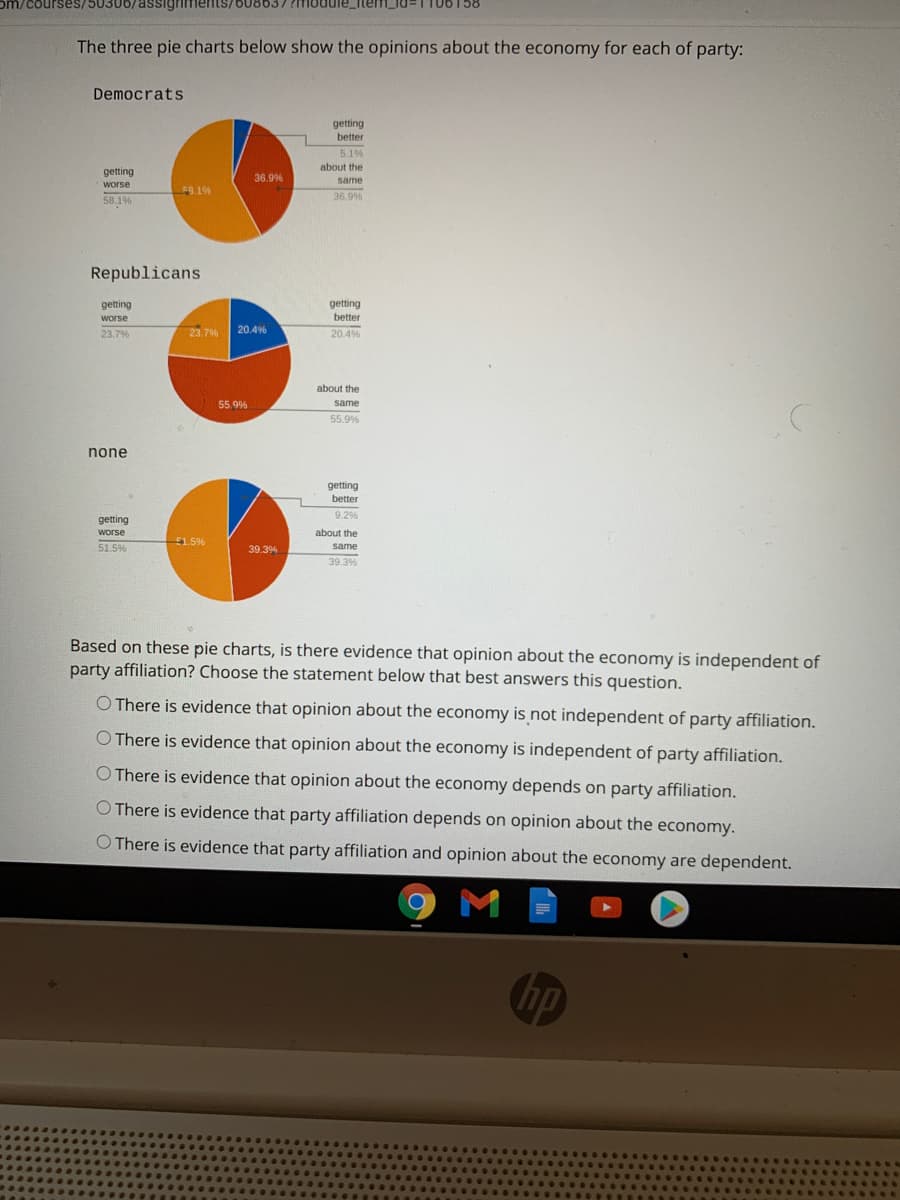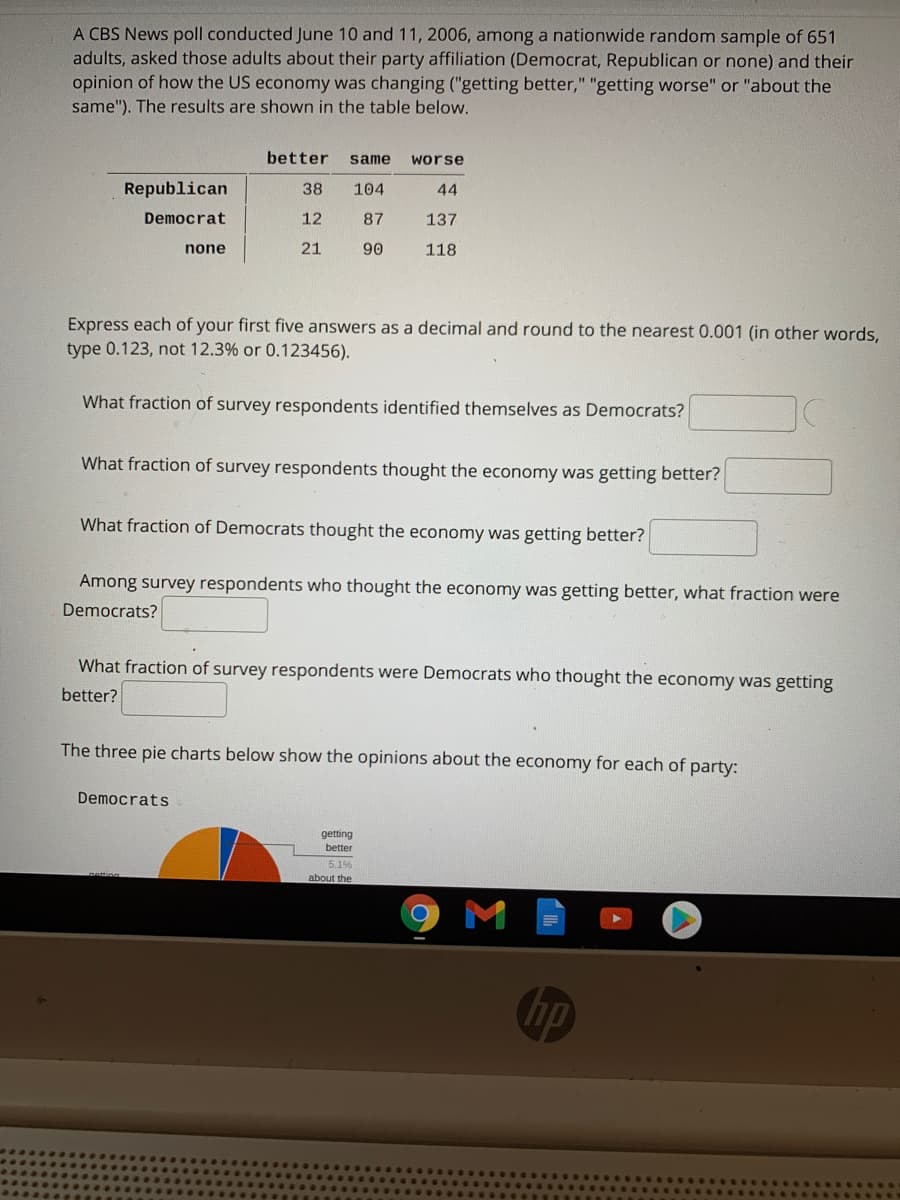The three pie charts below show the opinions about the economy for each of party: Democrats getting better 5.1% about the getting 36.99% same worse F9 196 36.9% 58.16 Republicans getting getting better worse 23.7% 23.7% 20.4% 20.4% about the 55.9% same 55.9% none getting better 9.2% getting worse about the 1.5% 51.5% 39.394 same 39.3% Based on these pie charts, is there evidence that opinion about the economy is independent o party affiliation? Choose the statement below that best answers this question. O There is evidence that opinion about the economy is not independent of party affiliation. O There is evidence that opinion about the economy is independent of party affiliation. O There is evidence that opinion about the economy depends on party affiliation. O There is evidence that party affiliation depends on opinion about the economy. O There is evidence that party affiliation and opinion about the economy are dependent.
The three pie charts below show the opinions about the economy for each of party: Democrats getting better 5.1% about the getting 36.99% same worse F9 196 36.9% 58.16 Republicans getting getting better worse 23.7% 23.7% 20.4% 20.4% about the 55.9% same 55.9% none getting better 9.2% getting worse about the 1.5% 51.5% 39.394 same 39.3% Based on these pie charts, is there evidence that opinion about the economy is independent o party affiliation? Choose the statement below that best answers this question. O There is evidence that opinion about the economy is not independent of party affiliation. O There is evidence that opinion about the economy is independent of party affiliation. O There is evidence that opinion about the economy depends on party affiliation. O There is evidence that party affiliation depends on opinion about the economy. O There is evidence that party affiliation and opinion about the economy are dependent.
Holt Mcdougal Larson Pre-algebra: Student Edition 2012
1st Edition
ISBN:9780547587776
Author:HOLT MCDOUGAL
Publisher:HOLT MCDOUGAL
Chapter11: Data Analysis And Probability
Section: Chapter Questions
Problem 8CR
Related questions
Question

Transcribed Image Text:om/courses/50306/assignments/608637? module_item_id=1106158
The three pie charts below show the opinions about the economy for each of party:
Democrats
getting
better
5.1%
about the
getting
36.99%
same
worse
F9.196
58.196
36,9%
Republicans
getting
getting
worse
better
23.79%
23.7%
20.4%
20.4%
about the
55.9%
same
55.9%
none
getting
better
9.2%
getting
worse
about the
51.59%
51.5%
39.3%
same
39.3%
Based on these pie charts, is there evidence that opinion about the economy is independent of
party affiliation? Choose the statement below that best answers this question.
O There is evidence that opinion about the economy is not independent of party affiliation.
O There is evidence that opinion about the economy is independent of party affiliation.
O There is evidence that opinion about the economy depends on party affiliation.
O There is evidence that party affiliation depends on opinion about the economy.
O There is evidence that party affiliation and opinion about the economy are dependent.
M
hp

Transcribed Image Text:A CBS News poll conducted June 10 and 11, 2006, among a nationwide random sample of 651
adults, asked those adults about their party affiliation (Democrat, Republican or none) and their
opinion of how the US economy was changing ("getting better," "getting worse" or "about the
same"). The results are shown in the table below.
better
same
worse
Republican
38
104
44
Democrat
12
87
137
none
21
90
118
Express each of your first five answers as a decimal and round to the nearest 0.001 (in other words,
type 0.123, not 12.3% or 0.123456).
What fraction of survey respondents identified themselves as Democrats?
What fraction of survey respondents thought the economy was getting better?
What fraction of Democrats thought the economy was getting better?
Among survey respondents who thought the economy was getting better, what fraction were
Democrats?
What fraction of survey respondents were Democrats who thought the economy was getting
better?
The three pie charts below show the opinions about the economy for each of party:
Democrats
getting
better
5.156
about the
M
hp
Expert Solution
This question has been solved!
Explore an expertly crafted, step-by-step solution for a thorough understanding of key concepts.
This is a popular solution!
Trending now
This is a popular solution!
Step by step
Solved in 7 steps

Knowledge Booster
Learn more about
Need a deep-dive on the concept behind this application? Look no further. Learn more about this topic, statistics and related others by exploring similar questions and additional content below.Recommended textbooks for you

Holt Mcdougal Larson Pre-algebra: Student Edition…
Algebra
ISBN:
9780547587776
Author:
HOLT MCDOUGAL
Publisher:
HOLT MCDOUGAL

Algebra & Trigonometry with Analytic Geometry
Algebra
ISBN:
9781133382119
Author:
Swokowski
Publisher:
Cengage

Holt Mcdougal Larson Pre-algebra: Student Edition…
Algebra
ISBN:
9780547587776
Author:
HOLT MCDOUGAL
Publisher:
HOLT MCDOUGAL

Algebra & Trigonometry with Analytic Geometry
Algebra
ISBN:
9781133382119
Author:
Swokowski
Publisher:
Cengage